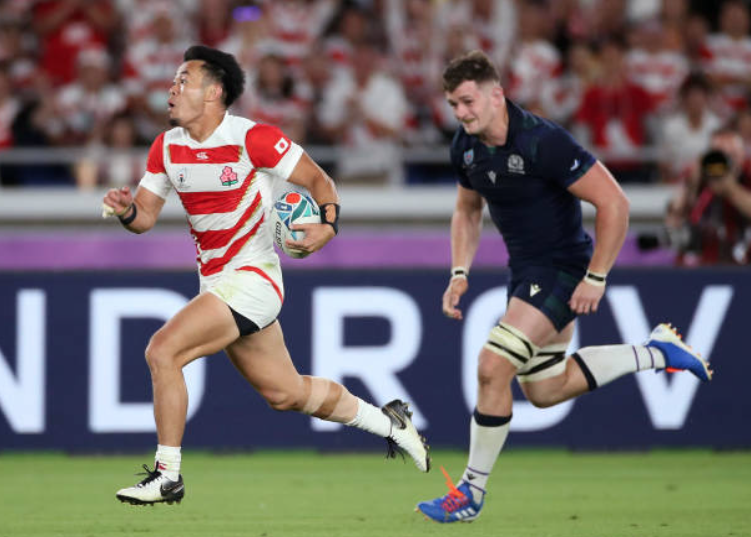DYLAN JACK looks at where the World Cup clash between Japan and Scotland in Yokohama on Sunday was won and lost.
ATTACK
One of the keys to Japan’s victory, as well as a big reason why they have progressed unbeaten to the playoffs, has been their attack. Despite falling behind early in the game, Japan quickly found their groove, with their fast yet disciplined phase play tiring Scotland and producing gaps for wings Kenki Fukuoka and Kotaro Matsushima to exploit.
Scrumhalf Yakuta Nagare was also excellent on Sunday, zipping from ruck to ruck and ensuring Japan kept a high pace to their attack in the first half. Despite only playing 50 minutes, Nagare made the most passes of any player in the match: 75. Unbeliveably, the scrumhalf did not put boot to ball once during his time on the park, demonstrating Japan’s focus on playing from ruck to ruck.
ALSO READ: Boks can’t afford to look past Japan
Japan forced Scotland into over 100 tackles in the first half and had 74% of possession. Fukuoka and Matsushima ended the game with 116 and 79 metres run, respectively. The two wings were busy throughout the first half, constantly coming off the side of the field to look for work.
By comparison, Scotland struggled to bring their wings Tommy Seymour and Darcy Graham into the game and relied heavily on the creativity of fullback Stuart Hogg and flyhalf Finn Russell. The two wings only managed to run a combined 42m in the match.
With nine carries across the gainline, centre Timothy Lafaele was possibly the unsung hero of Japan’s win. Lafaele ended the game with a 76m run, while also beating two defenders, and playing a key role in two of Japan’s tries in the first half.
DEFENCE
While Scotland started with a fast press, which was key to them regaining possession in the buildup to their first try, they could not keep this up in the first half. As previously stated, making over 100 tackles took its toll on Scotland in the first half.
However, things changed in the second half and one of the reasons was flank Jamie Ritchie’s influence. Ritchie was incredible at the breakdown, winning three turnovers and forcing Japan to commit more men to the breakdown, taking the sting out of their attack.
ALSO READ: Passion and skill power Japan
The game was turned on its head for the final 15 minutes, with Scotland dominating both territory and possession. For the last 10 minutes, Scotland launched a wave of attacks, seeing 73% of territory.
This is where Japan’s fitness and unity manifested itself. The loose trio of captain Michael Leitch, flank Lappies Labuschagne and No 8 Kazuki Himeno were immense in this regard. The trio made 39 tackles combined.
SET PIECE
Despite the overall lack of heft in comparison to Scotland, Japan importantly found a way to win their own ball at set piece. With South African-born props WP Nel and Allan Dell in their starting lineup, Scotland were expected to dominate at the scrum especially.
However, it was Dell who came second in his battle with both Jiwon Koo and then Asaeli Ai Valu in the first half. Dell was penalised on multiple occasions when Scotland had scrums just outside Japan’s 22m area.
Japan’s skill and technical prowess, especially with getting the ball in and out of the scrum as fast as possible, took away one of Scotland’s weapons and nullified the threat of both Dell and Nel.
Photo: Cameron Spencer/Getty Images





